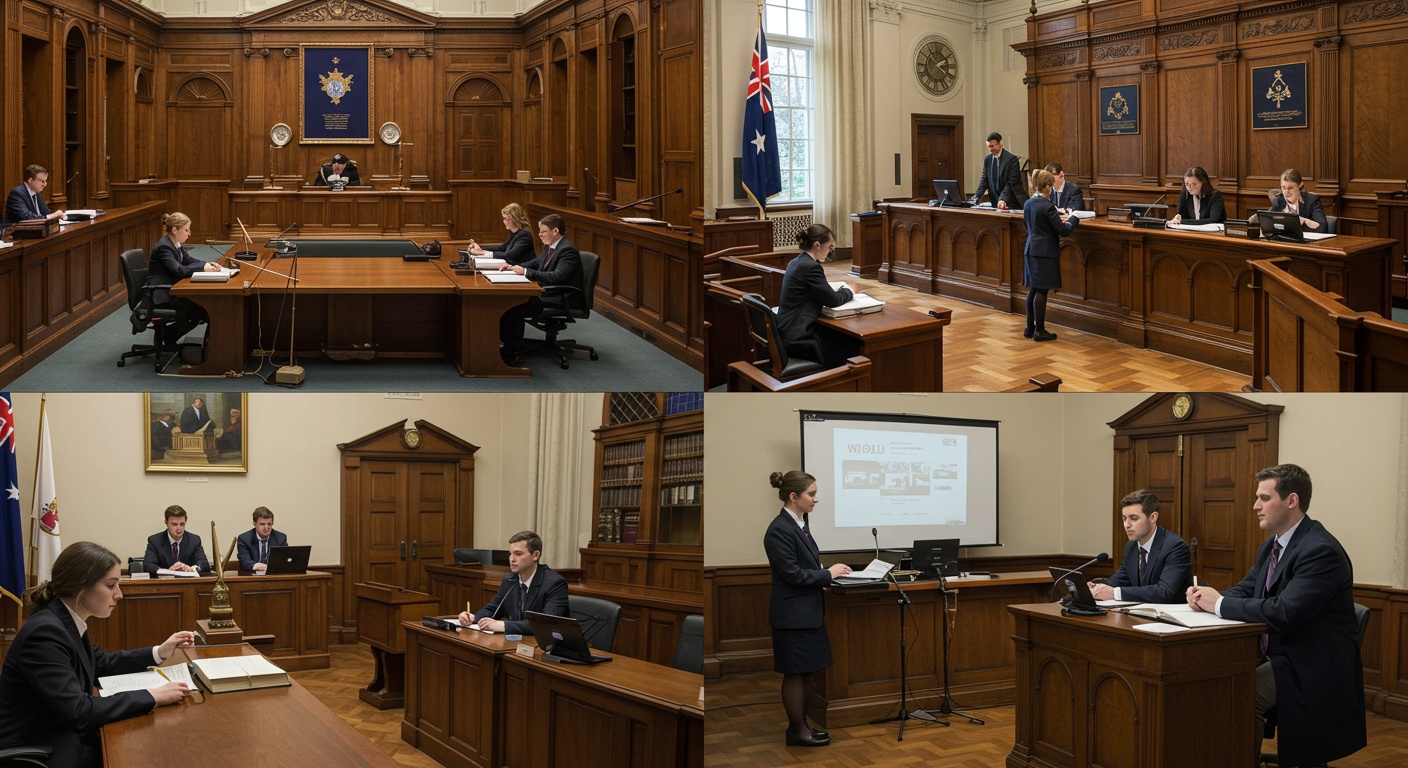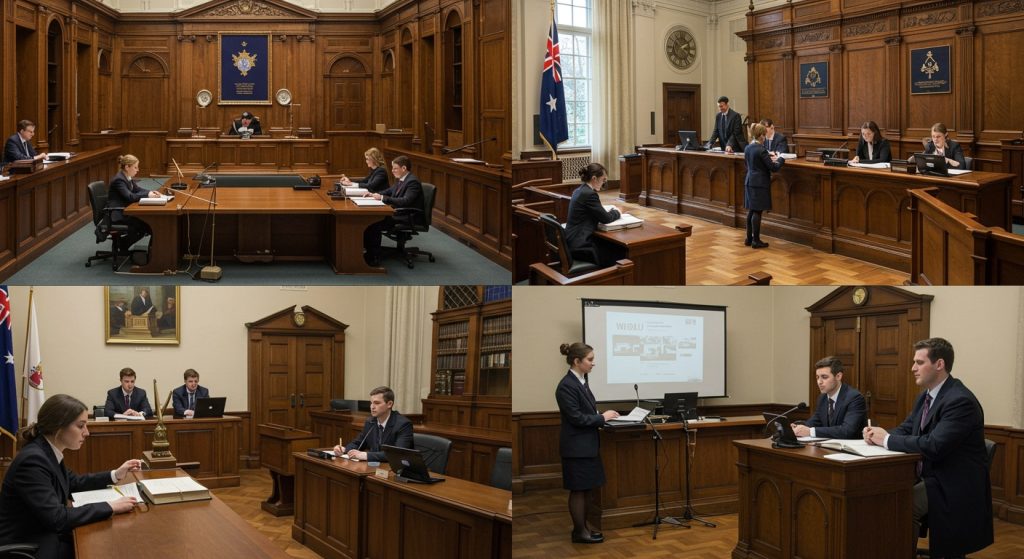Australia, a burgeoning hub for international legal education, offers a compelling pathway for aspiring lawyers seeking global perspectives. With the rise of cross-border transactions and international law firms demanding globally competent graduates, choosing the right law school is paramount. Key benefits include access to renowned faculty, exposure to diverse legal systems. Opportunities for international internships. This exploration delves into leading Australian law schools, focusing on institutions like the University of Melbourne and the University of Sydney, celebrated for their cutting-edge curriculum and impactful research. We spotlight critical learning outcomes, such as advanced legal reasoning, cross-cultural communication. Expertise in specialized areas like international trade law and human rights. Ultimately, this analysis aims to provide international students with the insights necessary to navigate their choices and embark on a successful legal career.

Understanding the Australian Legal Education System
Before diving into specific institutions, it’s crucial to comprehend how legal education works in Australia. The foundation of legal studies is typically the Bachelor of Laws (LLB) degree, an undergraduate program. Many universities also offer Juris Doctor (JD) programs, which are postgraduate law degrees for students who already hold a bachelor’s degree in another field. Both the LLB and JD qualify graduates to practice Law after completing practical legal training (PLT).
Accreditation by relevant state legal admission authorities ensures that a Law degree meets the required standards for graduates to be admitted as legal practitioners. The Council of Australian Law Deans (CALD) plays an crucial role in fostering excellence in legal education across the nation.
Key Factors for International Students to Consider
Choosing the right Law school is a significant decision. International students should consider several factors:
- Reputation and Ranking: University rankings, while not the only metric, provide insight into a school’s academic standing, research output. Graduate employability.
- Specialization Areas: Some Law schools excel in specific areas, such as international Law, environmental Law, or corporate Law. Consider your interests.
- Location: Australia is a vast country. Consider the city’s lifestyle, cost of living. Proximity to relevant industries.
- Visa Requirements and Support: Ensure the university offers comprehensive support for international students, including visa assistance and orientation programs.
- Tuition Fees and Scholarships: Law degrees can be expensive. Research tuition fees and explore scholarship opportunities offered by the university and external organizations.
- Career Services and Networking Opportunities: A strong career services department can help with internships, clerkships. Graduate employment.
- Clinical Legal Education: Practical experience is vital. Look for schools with strong clinical legal education programs that offer hands-on experience in real-world legal settings.
The University of Melbourne Law School
The University of Melbourne Law School consistently ranks among the top Law schools globally. Its distinguished faculty, rigorous curriculum. Strong research focus make it a highly sought-after institution.
- Strengths: Strong focus on legal theory, a wide range of specialized subjects (including international Law, human rights Law. Commercial Law). Excellent career services.
- Programs: Offers both LLB and JD programs, as well as specialized LLM (Master of Laws) degrees.
- Real-World Application: The Law school has strong connections with legal firms and organizations, facilitating internships and networking opportunities. Many graduates pursue careers in international organizations, government. Private practice.
The University of Sydney Law School
The University of Sydney Law School is another prestigious institution renowned for its academic excellence and commitment to social justice.
- Strengths: Strong emphasis on practical legal skills, a diverse range of elective subjects. A vibrant student community.
- Programs: Offers both LLB and JD programs, as well as a variety of postgraduate Law degrees.
- Real-World Application: The Law school has a strong clinical legal education program, offering students hands-on experience through legal aid clinics and community outreach programs. Students also have opportunities to participate in moot court competitions, honing their advocacy skills.
The Australian National University (ANU) College of Law
Located in Canberra, the Australian capital, the ANU College of Law offers a unique learning environment with a focus on government and public Law.
- Strengths: Specialization in public Law and international Law, access to government institutions and policymakers. A strong research culture.
- Programs: Offers both LLB and JD programs, as well as specialized LLM degrees.
- Real-World Application: The Law school’s location in Canberra provides students with unique opportunities to engage with government and parliamentary processes. Graduates often pursue careers in government departments, international organizations. Policy advocacy.
Monash University Faculty of Law
Monash University Faculty of Law, located in Melbourne, is known for its innovative teaching methods and commitment to social justice.
- Strengths: Focus on clinical legal education, a wide range of specialized subjects (including human rights Law and environmental Law). A strong emphasis on practical legal skills.
- Programs: Offers both LLB and JD programs, as well as specialized LLM degrees.
- Real-World Application: The Law school has a strong clinical legal education program, offering students hands-on experience through legal aid clinics and community outreach programs. Students also have opportunities to participate in moot court competitions, honing their advocacy skills. A graduate I know secured a role in a human rights organization due to her clinical experience at Monash.
The University of Queensland (UQ) TC Beirne School of Law
The University of Queensland’s TC Beirne School of Law is a leading Law school known for its research excellence and strong industry connections.
- Strengths: Strong focus on commercial Law and international Law, a wide range of specialized subjects. Excellent career services.
- Programs: Offers both LLB and JD programs, as well as specialized LLM degrees.
- Real-World Application: The Law school has strong connections with legal firms and organizations, facilitating internships and networking opportunities. Graduates often pursue careers in corporate Law, international trade. Government.
Bond University Faculty of Law
Located on the Gold Coast, Bond University Faculty of Law offers a unique trimester system that allows students to complete their Law degrees in a shorter time frame.
- Strengths: Accelerated learning program, strong emphasis on practical legal skills. A supportive learning environment.
- Programs: Offers both LLB and JD programs.
- Real-World Application: The Law school has a strong focus on practical legal skills, with opportunities for students to participate in moot court competitions and internships. Graduates often pursue careers in private practice and corporate Law.
Comparing Law Schools: A Quick Guide
This table provides a simplified comparison of the mentioned Law schools based on key factors for international students.
| Law School | Location | Key Strengths | Program Highlights | Ideal For |
|---|---|---|---|---|
| University of Melbourne Law School | Melbourne | Legal Theory, Research | Wide range of specializations | Students interested in academia and high-level legal theory. |
| University of Sydney Law School | Sydney | Practical Skills, Social Justice | Clinical Legal Education | Students seeking hands-on experience and social impact careers. |
| ANU College of Law | Canberra | Public Law, International Law | Access to government institutions | Students interested in government and policy-related Law. |
| Monash University Faculty of Law | Melbourne | Clinical Legal Education, Innovation | Human Rights Law | Students passionate about social justice and practical legal work. |
| UQ TC Beirne School of Law | Brisbane | Commercial Law, Industry Connections | Strong career services | Students interested in corporate and commercial Law careers. |
| Bond University Faculty of Law | Gold Coast | Accelerated Learning, Practical Skills | Trimester system | Students seeking a faster path to graduation and practical skills. |
Navigating the Application Process
Applying to Australian Law schools as an international student involves several steps:
- Research Admission Requirements: Each university has specific academic and English language proficiency requirements. Check the university’s website for detailed data.
- Prepare Required Documents: Typically, you’ll need to submit academic transcripts, English language test scores (IELTS or TOEFL), a personal statement. Letters of recommendation.
- Apply Online: Most universities have online application portals. Ensure you meet the application deadlines.
- Accept Your Offer and Obtain a Visa: If you receive an offer, accept it and begin the visa application process. The university will provide guidance on visa requirements.
- Prepare for Arrival: Familiarize yourself with Australian culture, the university campus. Local resources. Attend orientation programs to ease your transition.
Conclusion
Choosing the right law school in Australia is a significant step, one that demands careful consideration of your career aspirations and personal preferences. Remember, the rankings and prestige are crucial. Equally vital is finding a program that aligns with your specific interests, whether it’s international law, human rights, or corporate governance. The road ahead involves diligent application preparation, including crafting a compelling personal statement that showcases your passion for law and your unique contributions. Don’t underestimate the power of networking; connect with current students and alumni to gain firsthand insights into the culture and opportunities each school offers. Ultimately, success in law, regardless of which institution you choose, hinges on your dedication, perseverance. Commitment to ethical practice. Embrace the challenges, seek mentorship. Never stop learning. Your journey to becoming a successful lawyer in Australia starts now!
More Articles
Top Law Schools in Canada for International Students
Best Colleges for Law in USA: A Comparative Overview
Best Business Management Programs in the United Kingdom
Leading Universities for Data Science in Germany
FAQs
So, I’m an international student keen on studying law in Australia. What are some of the top law schools I should be looking at?
Alright, thinking about Australia for law is a great move! For consistently high rankings and strong international reputations, definitely consider the University of Melbourne, the University of Sydney. UNSW (University of New South Wales). They’re powerhouses. Also, check out Monash University and the Australian National University (ANU) – both excellent choices.
What makes a law school ‘good’ for international students specifically? Is it just about rankings?
Rankings matter, sure. It’s more than that! Look for schools with established international student support services, a diverse student body (you’ll want to feel welcome!). Programs that cater to international law or comparative legal studies. Think about practical stuff too: visa assistance, accommodation help. Career advice geared towards international grads are all super essential.
Do these top Aussie law schools offer scholarships for international students? Getting that tuition covered would be awesome!
They definitely do! Competition can be fierce, though. Each university has its own scholarship programs, so you’ll need to check their websites individually. Look for scholarships specifically earmarked for international students or those based on academic merit. Start your research early, because deadlines can sneak up on you.
Are there specific areas of law where certain Aussie universities excel? Like, is one school better for environmental law than another?
Good question! Yes, absolutely. While all the top schools offer a solid general law education, some have particular strengths. For example, ANU is often highly regarded for public and international law. Melbourne might stand out for commercial law. Do a deep dive into their faculty profiles and research centres to see who’s doing what in your area of interest.
Okay, admissions. What kind of grades or qualifications do I need to even be considered at these top schools?
Entry requirements vary depending on your background. Expect the bar to be high. Generally, you’ll need excellent academic results from your previous studies (think a strong GPA or equivalent). You’ll also need to demonstrate English language proficiency through tests like IELTS or TOEFL. Check each university’s specific requirements well in advance – they’re usually pretty detailed on their websites.
Besides lectures and textbooks, what kind of practical experience do these law schools offer? Internships, moot courts, anything like that?
Practical experience is a huge part of it! All the top law schools offer mooting competitions (simulated court hearings), clinical legal education programs (where you get to work on real cases under supervision). Opportunities for internships or clerkships with law firms, government agencies, or NGOs. Look for schools that actively promote and support these kinds of activities – they’re gold for your career!
What’s the job market like for international law grads in Australia? Can I actually get a job after graduating?
The job market can be competitive. It’s definitely possible! Networking is key. Building connections during your studies through internships and attending industry events will significantly improve your chances. Also, consider whether you want to practice law in Australia long-term, as that will involve further qualifications and admission to the legal profession in a specific state or territory.



